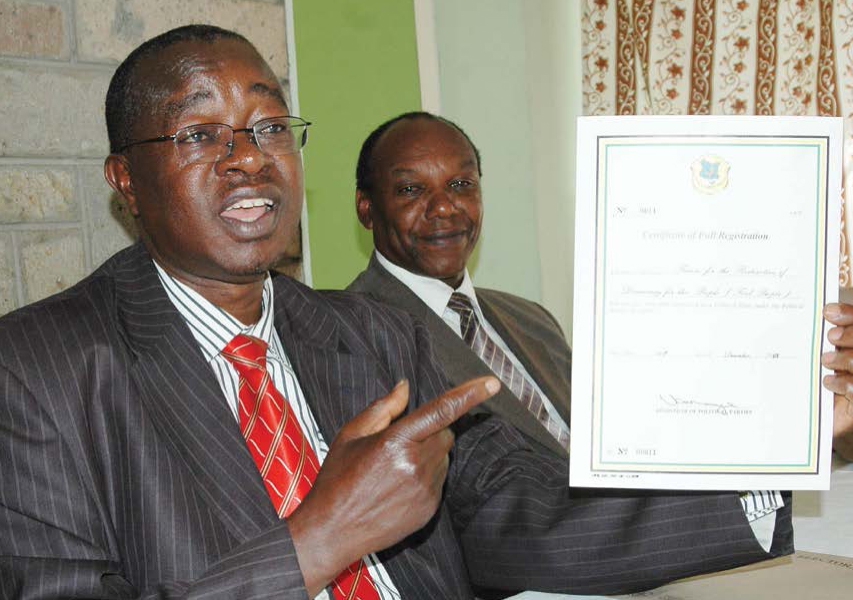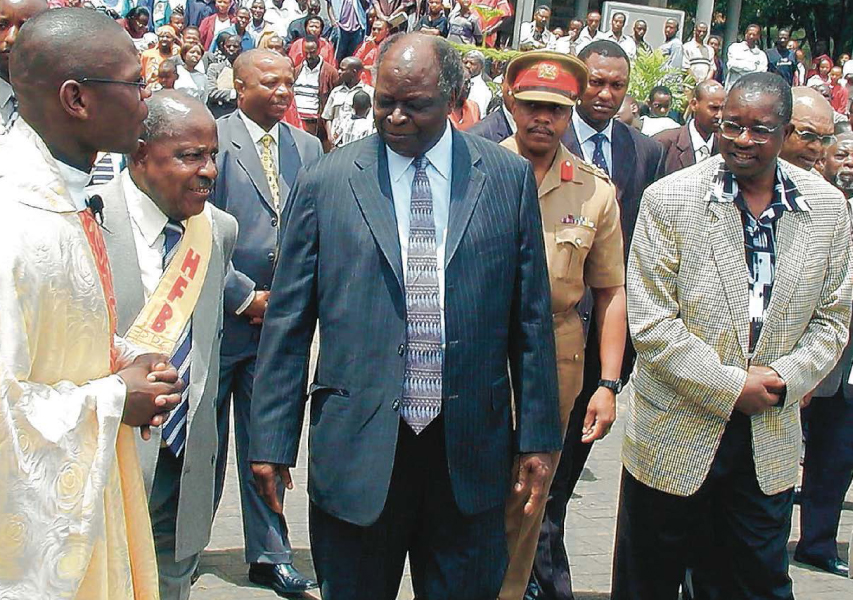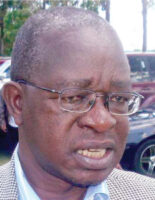
Having both been educated in the UK – Mr Obwocha with a master’s degree in economics from Oxford, and Mr Kibaki with a master’s degree also in economics from the London School of Economics – Mr Obwocha had come into the President’s court under the wings of Simeon Nyachae’s Ford People.
The party, together with KANU, had been roped in after the Raila Odinga-led Liberal Democratic Party (LDP) wing of the National Rainbow Coalition (NARC) was ejected and Government of National Unity formed following incessant squabbles over a pre-election Memorandum of Understanding and a referendum on the Constitution that the government lost.
Besides Mr Obwocha, others who joined the government at this time were Mr Nyachae (Agriculture), John Koech (East African Community), Njenga Karume (Defence) and Mutua Katuku (Water Resources).
Mr Obwocha, Mr Kibaki’s minister of Planning and National Development from 2006 to 2008, the man with a professorial look, was a reputed early riser, with 5am often finding him in his office at the Treasury Building on Nairobi’s Harambee Avenue.
In Plato’s The Republic, the best form of government is that in which philosophers rule. He believed that these philosopher kings – leaders who possessed both a love of wisdom and intelligence as well as a willingness to live a simple life – were best suited for a just society. In Mr Kibaki’s book, these, too, were the people who should run the key Planning and National Development ministry.
And so it was that even before Mr Obwocha came to the scene, Kibaki’s first Planning minister right from 2003 to 2005 (when he was sacked alongside fellow LDP rebels) was Prof Anyang Nyong’o, another cool and collected intellectual who had earned a PhD in political science from the University of Chicago. Wycliffe Oparanya, who, though not bookish in mien—his education up to master’s level notwithstanding—seemed to command a reflective and serene personality, succeeded Mr Obwocha.
While Mr Obwocha earned his ministerial position courtesy of the falling-out among leaders of NARC following the 2005 referendum that forced Mr Kibaki to look for allies in KANU and Ford People, he is reputed to have gelled well with the President and his lieutenants – and only lost his Cabinet position after he failed in his re-election bid in 2007.
The MP for West Mugirango from 1992 to 2007 counted negotiations with the Kenyan community abroad in the push for dual citizenship that was later included in the 2010 Constitution as one of his proudest achievements.
Many Kenyans abroad had for years clamoured to enjoy the economic prosperity of their adopted homelands while retaining the warmth of their motherland. They had also indicated they would invest more if they had dual citizenship.
In May 2007, Mr Obwocha launched a new national atlas that was aimed at establishing the links between poverty and the environment. Known as ‘Nature’s Benefits in Kenya’, the atlas established a correlation between natural resources such as water sources, wood supply and wildlife populations to information including human habitation, economic activities and household expenditure.
According to Mr Obwocha, the atlas, which was developed by the Kenyan government jointly with the private global bodies International Livestock Research Institute and World Resources Institute, helped in formulating government policy.
During the launch Nobel Laureate Wangari Maathai praised the atlas, saying that if properly implemented it would help break the “cycle of unenlightened decision-making that is not accountable to the people most affected by economic or environmental changes.”
A member of the National Economic and Social Council (NESC) that drafted Kenya’s Vision 2030 development blueprint launched by President Mwai Kibaki on 30 October 2006, it fell on Mr Obwocha to drive the Head of State’s pet project that sought to transform Kenya into an economic powerhouse in the region.
Mr Obwocha’s first task on assuming office was to drive the initial implementation process that identified the means of eradicating poverty, hunger, widespread unemployment, and the diffusion of curable mortal diseases such as malaria and waterborne diseases.
But the MP, then in his third term, was not new to economic planning. Prior to his elevation, Mr Obwocha, an accountant by training, had had a stint as Assistant Minister for Finance.
Regarded as one of the high performers in the Cabinet, Mr Obwocha in 2006 doubled up as the Minister for Energy, making him one of the few ministers in the Kibaki government to run two full ministries concurrently. Kiraitu Murungi, the substantive energy minister, had resigned under a cloud of corruption allegations.
Mr Obwocha, in August 2007, faced a major test in Parliament when nominated MP Julia Ojiambo moved a motion to introduce the Arid and Semi-Arid Land (ASAL) Development Bill, which sought to guarantee the channelling of investment capital into ASALs to increase Kenya’s land productivity by involving residents of ASALs in Kenya’s wealth creation.

The minister was hard-pressed to explain what the government had done for the ASALs, which cover 80 per cent of Kenya’s total land surface and support 20 per cent of the human population in addition to over 80 per cent of the country’s livestock production and 65 per cent of the country’s wildlife.
He explained: “The Government recognises the potential of ASALs as highlighted in the Economic Recovery Strategy (ERS) and development for North Eastern Province, that is, Isiolo, Marsabit and Moyale, as a first step. This programme has been expanded to other areas with a view to opening up these areas and fully exploiting the untapped potential in the ASALs.”
Mr Obwocha calmed the agitated Parliament when he explained that the key development initiatives targeted human resource development, production, marketing, drought and food security, proper land tenure, natural resource management, infrastructure development and security.
“The aim here is to improve the livelihoods and build human development capacity as well as that of the community to improve their incomes,” he said.
Speaking in tenor, the highest male voice, Mr Obwocha was also game at fending off criticism from the Opposition benches. In Parliament in April 2007, Kenneth Marende, the then MP for Emuhaya constituency, asked Mr Obwocha what the government was doing to reduce poverty levels. “Surely, this Government must wake up and substantively address the plight of Kenyans,” Mr Marende said.
Mr Obwocha had a ready sharp rejoinder: “When this Government took power, it was awake. It cannot, therefore, wake up again! We are saying that in the new Budget, these [poverty-alleviation] programmes are going to be there.”
The following month, in May, he was at the forefront of explaining the government’s position after a dispute arose within NARC over the nomination of members of the East African Legislative Assembly. The LDP side was complaining that the NAK side had unilaterally nominated members of EALA without consulting their partners who were entitled to their share.
“This is an internal matter, particularly in political parties. These are issues that are resolved within either the political parties or in our own case, within our own country. If there is an issue, it can be sorted out by our own High Court. I am sure that is why these rules were proposed here,” he told Parliament, adding, tactfully, that the country needed permanent rules for the nominations of EALA members so that such disputes would not arise in the future.
Born in 1949, Mr Obwocha attended Kianungu PAG Primary School in Nyamira from 1957 to 1964 before proceeding to Kisii High School from 1965 to 1968 for his O Levels. He completed his A levels at the same school in 1970.
Mr Obwocha joined the University of Nairobi in 1971 where he studied commerce for his bachelor’s degree before proceeding to Oxford University in the United Kingdom for a master’s in economics and management. He also became a fellow of the Institute of Certified Public Accountants of Kenya as well as a member of the Institute of Certified Public Secretaries of Kenya.
From 1974 to 1992, Mr Obwocha worked with the Pyrethrum Board of Kenya in various positions in the accounts department, rising to chief accountant. In the meantime, in 1988, he founded Obwocha & Associates, an auditing firm that he ran until his death in 2018.
A founder member of KCA University (formerly Kenya College of Accountancy), Mr Obwocha collapsed in his Nairobi home after returning from the funeral of a relative in Nyamira. He was pronounced dead on arrival at Nairobi Hospital.
Mr Obwocha, who died aged 69, had lived with a donated kidney for 18 years and managed to keep the transplant so close to his chest that even his closest friends and relatives were shocked to learn of the secret when it was disclosed during his burial.
Mr Obwocha burst onto the political scene in the late 1980s during the agitation for multiparty democracy and the height of the crackdown on so-called “dissidents” by agents of President Daniel arap Moi’s government.
He contested the West Mugirango parliamentary seat in 1988 against incumbent David Onyancha Anasi. But that year, President Moi had introduced the queue-voting system that sought to weed out dissidents within KANU during the single-party rule. KANU bigwigs did not trust Mr Obwocha, a firebrand yet Mr Onyancha won the seat despite trends on the ground showing Mr Obwocha was more popular.
But with the reintroduction of multiparty politics, Mr Obwocha joined the opposition Ford Kenya ahead of the elections in 1992 and easily won against KANU’s Mr Onyancha. One of the lieutenants of the then Ford Kenya leader Jaramogi Oginga Odinga, Mr Obwocha worked closely with the group that was known as the “Young Turks”. The group included Raila Odinga, James Orengo, Gitobu Imanyara, Paul Muite, Kiraitu Murungi, Anyang’ Nyong’o, and Dr Mukhisa Kituyi.
An eloquent speaker and fiery critic of the KANU regime, Mr Obwocha was good on the podium as he knew how to work up crowds. On joining Parliament, he became one of the most outspoken debaters who kept the government side on its toes.
In 1997, he retained his seat on a Ford Kenya ticket, but come 2002, he switched over to Mr Nyachae’s Ford People, the party that was dominant in the Kisii region, and won. In 2007, however, James Ondicho Gesami of the Orange Democratic Movement (ODM), which had made inroads in Gusiiland, beat Mr Obwacha. Mr Obwocha’s defeat also marked the waterloo of Mr Nyachae, the regional supremo who was also defeated on his Nyaribari Chache turf.
Even after Mr Obwocha lost his seat and failed in his subsequent attempt to clinch the Nyamira senatorial seat in 2013, the Ford People national chairman remained active politically, aligning himself to the government of the day.
For this reason, in April 2015, having returned to private practice, he was appointed chairman of the Privatisation Commission of Kenya by President Uhuru Kenyatta.
He was tasked with turning loss-making government corporations — which included banks and sugar companies — into profitable entities, but died without achieving much, because several county governments had sued to stop the privatisation of some of the institutions that are based in their territories.
Speaking of Mr Obwocha’s simple life as opposed to the ostentatious lifestyles of many government ministers, former Vice President Kalonzo Musyoka said following the politician’s death: “As a Minister for Planning he could have planned not to live in one acre which we actually saw in Karen; he could have planned to live in thousands of acres. Instead, he chose to plan Vision 2030 and therefore stood out as an icon of integrity.”
Interviews with Nyamira residents and the region’s political analysts also painted Mr Obwocha as a courageous man who loved politics and the common man.
An early bloomer, Mr Obwocha campaigned for various West Mugirango politicians, including Matthew Ondeyo Nyaribari and David Onyancha, while still working as an accountant for the state-funded Pyrethrum Board of Kenya, in what later turned out to be understudy endeavours.
As an MP, Mr Obwocha distinguished himself as a crusader for human rights and champion of development projects at the grassroots.
By 1992, no single inch of tarmac existed in West Mugirango and this would be his pet project in pressing the KANU government to help tarmac the Kisii-Chemosit road, which was in the hearts of residents as it passed through the heartland of the constituency.
At one time, during the infamous cross-party defections, Mr Obwocha publicly turned down a request by President Moi that he defect from Ford Kenya to KANU.
This was during a fundraiser for Sironga Girls High School in Mr Obwocha’s constituency. The MP, who had a deceptively self-effacing mien, told the then dreaded Moi to his face that he could only defect once the Kisii-Chemosit road was fully tarmacked.
Timothy Bosire, the ODM national treasurer, remembers Mr Obwocha as a populist who blended well with common folk.
“Obwocha’s name was big. To date, you will hear it being mentioned in political debates across Nyamira County even though he is long dead. He knew how to get to his people’s hearts, his eloquence coming in as a great advantage to him,” says Mr Bosire, a former MP for neighbouring Kitutu Masaba.
Mr Bosire, however, thinks Mr Obwocha scored dismally on the development front. “There is no development project worth mentioning attached to his name in Nyamira,” he claims.
Be that as it may, the philosopher king, who was often found enjoying a mug of porridge with friends at Nairobi’s Kahawa restaurant on Kaunda Street after he lost his seat, may well have been curved out for planning and activism – in the mould of other outspoken politicians such as George Anyona and Martin Shikuku, and not so much for the development bit.
For on the planning and national development front he scored highly, earning the moniker of the “five-star performer” and helping President Kibaki oversee an epoch with one of the highest economic growths in Kenya’s history.
A study of Mr Kibaki’s choices for his Cabinets reveals a pattern. There were ministers he appointed because he thought they could help him achieve his vision for Kenya. Others came into his court by virtue of power-sharing dynamics or real politik. Henry Obwocha is one of those he most likely would have appointed if he had a clean slate to write on, because of the politician’s excellent work ethic and articulate defence of government programmes.
